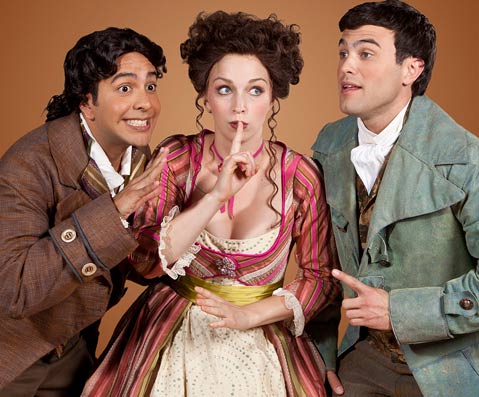The Barber of Seville at the Granada
The Music Academy of the West Presents Rossini

Opera fans can be forgiven for suspecting a typo as they glanced at the flyer for this summer’s Music Academy of the West production, The Barber of Seville. It states that veteran director Bruce Donnell will stage Rossini’s comic masterpiece—so far, so good—while Warren Jones will conduct.
Hold on: Warren Jones? The award-winning collaborative pianist who travels the world giving recitals with singers? The supremely sensitive artist admired locally for his chamber music performances with Camerata Pacifica, as well as his master classes? He’s trading in his Steinway for a baton?
In fact, he is. And while it’s far from the first time, it’s not something he does all that often.
“I’m asked to conduct, but I almost always say no,” Jones said in a recent interview. “I did a little bit when I was younger, and I’ve done it more in the last four or five years. I did a set of concerts in Asia with (renowned tenor) Salvatore Licitra.
“Conducting, for me, is not the be-all and end-all. I’m interested, but only in situations like this—where people know what they’re doing, there’s a supportive team, and there’s enough time to get a good result.”
It’s also more enticing if the piece he’s asked to conduct is a work of genius. That description certainly fits The Barber of Seville, which will be performed Friday night and Sunday afternoon in the Granada Theatre. Its plot—a young man, aided by a clever servant, manages to outsmart an older rival and win the hand of a beautiful woman—“goes back to the Greeks and Romans,” director Donnell noted.
But given that familiar outline, the libretto is unusually sophisticated. Like Mozart’s Don Giovanni (which is essentially a sequel, featuring many of the same characters), it is based on a play by Pierre Beaumarchais, a writer renowned for his wit and humanity.
“The characters are fully rounded,” Donnell said. “They all make mistakes and forgive each other their mistakes. So you start with characters you really believe in and care about. Then you have music that expresses both what they’re doing and what they’re thinking. It’s really a very sophisticated score. Its brilliance sneaks up on you. It has farcical elements,” Donnell added, “but so does life. I’ve learned from experience that comedy is a whole lot harder to direct than tragedy. The way to make comedy funny is to take it seriously. One character is always falling asleep. I think it’s funnier if characters don’t point it out, but rather they just cope with it. When you have a comic situation, you let it speak for itself.”
Both Jones and Donnell describe the rehearsal process as one of exploration and collaboration. There are no prima donnas in this production—onstage, backstage, or in the orchestra pit.
“I try to draw the performance out of the artist, rather than impose something on them,” Donnell said. “Some of the bits come out of something that happened in rehearsal. We’ll say, ‘Let’s run with that.’ It’s such a gifted cast; the singers know their parts before we begin, but the production gets its personality as we work together.”
“I know how I want the piece to go,” Jones added. “I know what I want to hear. But I’m practical enough to know there are some things that are not going to go the way that I want them to go, for a number of reasons. The singer can’t sing it that slow, or that fast, or that loud, or that soft. It’s not about being ‘right’; it’s about making it work. I try to prepare myself for rehearsals by knowing, as exhaustively as I can, what the possibilities are. Then I can choose from the possibilities. I don’t walk into a candy store saying ‘I have to have 1.645 grams of this particular kind of chocolate.’ It’s more, ‘I’d like some chocolate. Let’s see what they have.’”
Jones conceded that conducting poses some unique challenges—including, in this case, the fact that many, if not most, of his musicians (all Music Academy fellows) have never played an opera before.
“I’m used to playing the piano, which is an inanimate object,” he noted. “It’s a machine that I literally energize. It translates my energy into music. The orchestra for The Barber of Seville will have 50 very willful young adults, all of whom understand how to play their instruments better than I do. My role is to enlist them to play on the team.”
“Opera is a team sport,” he added. “One has to know when to lead, and when to just let it go its own way. That’s very much like playing the piano with a singer. There are moments when energy is coming from both sides of that exchange. One has to learn where to give the extra nudge, and where to take the extra nudge from the singer. I like that kind of situation.”
4•1•1
The Music Academy of the West presents Rossini’s The Barber of Seville on Friday, August 5, at 7:30 p.m. and Sunday, August 7, at 2:30 p.m. at the Granada Theatre. Tickets are $10-$120. For info, call 899-2222 or see musicacademy.org.



